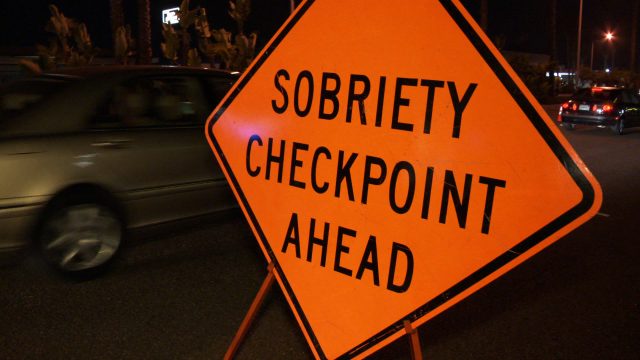Law Enforcement Should Prove That DUI Checkpoints Work

North Dakota’s legislature is considering HB1084 which, if passed, would make it illegal for law enforcement to “halt an operator of a vehicle solely to determine compliance” with traffic laws.
I first wrote about this bill a month ago, but now law enforcement officials are weighing in and – surprise! – they don’t like it.
One reasonable concern law enforcement officials bring up is that this might be so overly broad that it would prevent them from pulling over commercial drivers to check their logs or verify that they’re complying with load limits, but that can be easily fixed by narrowing the focus of the law.
I think what concerns most North Dakotans are the DUI checkpoints, which have a “papers, please” look and feel to them, but law enforcement officials insist they work. Because they “send a message” or something.
Fargo police have conducted 62 checkpoints since 2004, the year they were introduced. There were an average of four checkpoints a year until staff shortages forced them to cut back, said Fargo Sgt. Jim Kringlie.
Three people were arrested for drunken driving in the most recent Fargo checkpoint Aug. 29. Kringlie said their effectiveness shouldn’t be measured in number of arrests.
He said checkpoints send a message to drunken drivers that even though an officer may not be around to see them making a driving error, they could still be caught driving drunk.
This part, in which Sgt. Kringlie claims that DUI checkpoints are optional, made me laugh:
Kringlie said drivers aren’t forced to participate because police always put up signs warning drivers of the checkpoint as they approach an intersection, which allows them to avoid it.
“We think it’s working. We think there’s more taxis, more cars being left at night,” he said.
Right. I’m sure we all feel that we can turn around and drive away from a police checkpoint without any possible consequences. Like, say, a cop chasing us down and pulling us over anyway. The checkpoints may be voluntary in theory, but reality is a different matter.
And where is the hard data illustrating that the checkpoints lower the number of alcohol-related traffic accidents and fatalities? They’ve been around for some time now. Can law enforcement measure their efficacy beyond anecdotes?
I don’t think they can. In fact, they seem to be a monumental waste of law enforcement resources. According to this article from July, which covers the declining number of checkpoints operated in the Fargo area, it seems that each checkpoint requires 10 officers to work it and averaged about two arrests.
That seems like a tiny impact given the number of law enforcement personnel dedicated to the task. Wouldn’t those 10 officers have been used more effectively elsewhere?
Something tells me that law enforcement officials are more worried about losing the grant dollars they often get to run DUI checkpoints than they are about whether or not the law actually works. If they can’t illustrate that these checkpoints make our roads safer – with hard data, not anecdotes and baseless assurances – then HB1084 should pass.




